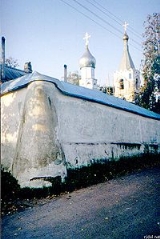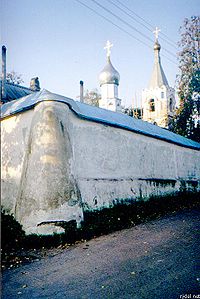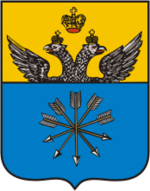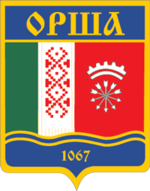
Orsha
Encyclopedia
Orsha is a city in Belarus
in Vitebsk voblast on the fork of the Dnieper
and Arshytsa rivers.


 Orsha was first mentioned in 1067 as Rsha , making it one of the oldest towns in Belarus. The town was named after the river, which was originally also named Rsha, probably from a Baltic
Orsha was first mentioned in 1067 as Rsha , making it one of the oldest towns in Belarus. The town was named after the river, which was originally also named Rsha, probably from a Baltic
root *rus 'slowly flowing.'
In 1320, Orsha became a part of the Grand Duchy of Lithuania
. In 1398-1407, the Orsha castle was built. On September 8, 1514 the famous Battle of Orsha
occurred, between allied Grand Duchy of Lithuania
with Kingdom of Poland
and Russia
n army. Russians suffered significant defeat, however victorious Grand Duchy of Lithuania did not fully avail its victory.
In 1555, Mikołaj "Czarny" Radziwiłł founded a Calvinist (Protestant) order in Orsha, one of the first in the Belarusian lands. From the sixteenth to eighteenth centuries Orsha was a notable religious centre, with dozens of Orthodox, Protestant and Catholic churches and orders. The town was also home to a large Jewish population.
Orsha was granted Magdeburg Rights
in 1620. In 1630, S. Sobal opened the first printing house at the Kuciejna monastery, which became a well-known centre of Cyrillic-alphabet publishing. The town was damaged during the Russo-Polish War (1654-1667), which was a disaster for Grand Duchy of Lithuania. During the First Polish partition
the city was taken over by the Russian Empire
in 1772, and became part of the Mogilyov
Gubernia
. Under Russian rule, it was stripped of its Magdeburg Rights in 1776 and went into cultural and economic decline. The population dropped sharply to just about 2,000 inhabitants. The city symbol in 1781 was changed to one which included the symbol of the Russian empire
and five arrows.
 In 1812, the city was badly burned during Napoleon's invasion. At the time of Orsha had been taken under control of French troops, there was a French writer Marie-Henri Beyle (also known under the pen name
In 1812, the city was badly burned during Napoleon's invasion. At the time of Orsha had been taken under control of French troops, there was a French writer Marie-Henri Beyle (also known under the pen name
Stendhal
) in a rank of intendant
.
During the First World War, the city was occupied by German forces in February–October 1918. From February 2, 1919, Orsha became a part of Homyel region (Vitebsk region, 1920) of Soviet Russia. After the formation of the Soviet Union, it was transferred to the Byelorussian SSR
in 1924.
The population before World War II
was about 37,000. The city was occupied by Germany on July 16, 1941. The occupiers founded several concentration camps in the city, where an estimated 19,000 people were killed.
There is a widespread Soviet myth of Katyusha [Katyusha rocket launcher|Katyusha]] multiple rocket launcher's maiden attack of July 14, 1941 at Orsha, destroying a station with several supply trains. This legend obviously conflicts the fact that Orsha remained at the hands of the Soviet Army on July 14 and through July 15, 1941. And even on July 16, 1941 the German troops were unlikely to invade Orsha aboard their supply trains. Thus, had the Katyusha’s rockets fallen on any supply trains on July 16, 1941 those would have been the Soviet trains unable to have left Orsha railroad station. See Russian Wikipedia's article "Гвардейские реактивные минометы" ("Guards Mortars"). The multiple rocket launchers were top secret in the beginning of World War II and any records of their actions in July 1941 were forbidden, which fact led to numerous rumors and myths. The Soviets encouraged and co-ordinated undercover anti-fascist resistance groups, and one of the most famous was a partisan brigade under the command of Kanstantsin Zaslonau (Konstantin Zaslonov), operating from the Orsha train depot. His group planted ninety-three bombs on German trains in just three months. After March 1942, he went in hiding in the forests, where he and his group continued guerilla warfare. He was killed in action on November 14, 1942. Soviet troops liberated Orsha on June 27, 1944.
club Start
has produced players for the Belarus national bandy team.
 Orsha became an important transportation center after the construction of a Dnieper River port. The coming of railway lines in the second half of the nineteenth century greatly contributed to the city growth:
Orsha became an important transportation center after the construction of a Dnieper River port. The coming of railway lines in the second half of the nineteenth century greatly contributed to the city growth:
Today, Orsha is a major railway node where the Minsk–Moscow crosses the northern Viciebsk line, which branches south to Mogilev
and Kryčaŭ. All trains from Moscow and Saint-Petersburg bound for Western Europe
pass through Orsha.
The city is also a junction of the important motorways: The M1 (E30) Moscow-Brest and the M8/M20 (E95) Saint Petersburg - Odessa.
diseases attracted attention to this city. Before 1987 there were less than 100 new cancer patients registered each year. Since then the number grew fivefold, with more than 500 new patients registered per year as of 2004. The biggest growth was registered in 2003–04 (178%). This was widely reported in independent media, but Belarusian officials are silent about the alarming health situation and possible reasons for this high cancer rate. Two possible factors mentioned in the independent media are old Soviet military installations in Orsha, and the Chernobyl disaster
.
Belarus
Belarus , officially the Republic of Belarus, is a landlocked country in Eastern Europe, bordered clockwise by Russia to the northeast, Ukraine to the south, Poland to the west, and Lithuania and Latvia to the northwest. Its capital is Minsk; other major cities include Brest, Grodno , Gomel ,...
in Vitebsk voblast on the fork of the Dnieper
Dnieper River
The Dnieper River is one of the major rivers of Europe that flows from Russia, through Belarus and Ukraine, to the Black Sea.The total length is and has a drainage basin of .The river is noted for its dams and hydroelectric stations...
and Arshytsa rivers.
Facts
- Location: 54°28′14"N 30°19′05"E
- Population: 125,000 (est. 2004)
- Phone code: +375 216
- Postal codes: 211030, 211381–211394, 211396–211398
History



Baltic languages
The Baltic languages are a group of related languages belonging to the Balto-Slavic branch of the Indo-European language family and spoken mainly in areas extending east and southeast of the Baltic Sea in Northern Europe...
root *rus 'slowly flowing.'
In 1320, Orsha became a part of the Grand Duchy of Lithuania
Grand Duchy of Lithuania
The Grand Duchy of Lithuania was a European state from the 12th /13th century until 1569 and then as a constituent part of Polish-Lithuanian Commonwealth until 1791 when Constitution of May 3, 1791 abolished it in favor of unitary state. It was founded by the Lithuanians, one of the polytheistic...
. In 1398-1407, the Orsha castle was built. On September 8, 1514 the famous Battle of Orsha
Battle of Orsha
The Battle of Orsha was fought on 8 September 1514, between the allied forces of the Grand Duchy of Lithuania and Kingdom of Poland, under the command of Hetman Konstanty Ostrogski, and the army of Grand Duchy of Moscow under Konyushy Ivan Chelyadnin and Kniaz Mikhail Golitsin...
occurred, between allied Grand Duchy of Lithuania
Grand Duchy of Lithuania
The Grand Duchy of Lithuania was a European state from the 12th /13th century until 1569 and then as a constituent part of Polish-Lithuanian Commonwealth until 1791 when Constitution of May 3, 1791 abolished it in favor of unitary state. It was founded by the Lithuanians, one of the polytheistic...
with Kingdom of Poland
Kingdom of Poland (1385–1569)
The Kingdom of Poland of the Jagiellons was the Polish state created by the accession of Jogaila , Grand Duke of Lithuania, to the Polish throne in 1386. The Union of Krewo or Krėva Act, united Poland and Lithuania under the rule of a single monarch...
and Russia
Russia
Russia or , officially known as both Russia and the Russian Federation , is a country in northern Eurasia. It is a federal semi-presidential republic, comprising 83 federal subjects...
n army. Russians suffered significant defeat, however victorious Grand Duchy of Lithuania did not fully avail its victory.
In 1555, Mikołaj "Czarny" Radziwiłł founded a Calvinist (Protestant) order in Orsha, one of the first in the Belarusian lands. From the sixteenth to eighteenth centuries Orsha was a notable religious centre, with dozens of Orthodox, Protestant and Catholic churches and orders. The town was also home to a large Jewish population.
Orsha was granted Magdeburg Rights
Magdeburg rights
Magdeburg Rights or Magdeburg Law were a set of German town laws regulating the degree of internal autonomy within cities and villages granted by a local ruler. Modelled and named after the laws of the German city of Magdeburg and developed during many centuries of the Holy Roman Empire, it was...
in 1620. In 1630, S. Sobal opened the first printing house at the Kuciejna monastery, which became a well-known centre of Cyrillic-alphabet publishing. The town was damaged during the Russo-Polish War (1654-1667), which was a disaster for Grand Duchy of Lithuania. During the First Polish partition
Partitions of Poland
The Partitions of Poland or Partitions of the Polish–Lithuanian Commonwealth took place in the second half of the 18th century and ended the existence of the Polish–Lithuanian Commonwealth, resulting in the elimination of sovereign Poland for 123 years...
the city was taken over by the Russian Empire
Russian Empire
The Russian Empire was a state that existed from 1721 until the Russian Revolution of 1917. It was the successor to the Tsardom of Russia and the predecessor of the Soviet Union...
in 1772, and became part of the Mogilyov
Mogilev
Mogilev is a city in eastern Belarus, about 76 km from the border with Russia's Smolensk Oblast and 105 km from the border with Russia's Bryansk Oblast. It has more than 367,788 inhabitants...
Gubernia
Guberniya
A guberniya was a major administrative subdivision of the Russian Empire usually translated as government, governorate, or province. Such administrative division was preserved for sometime upon the collapse of the empire in 1917. A guberniya was ruled by a governor , a word borrowed from Latin ,...
. Under Russian rule, it was stripped of its Magdeburg Rights in 1776 and went into cultural and economic decline. The population dropped sharply to just about 2,000 inhabitants. The city symbol in 1781 was changed to one which included the symbol of the Russian empire
Russian Empire
The Russian Empire was a state that existed from 1721 until the Russian Revolution of 1917. It was the successor to the Tsardom of Russia and the predecessor of the Soviet Union...
and five arrows.

Pen name
A pen name, nom de plume, or literary double, is a pseudonym adopted by an author. A pen name may be used to make the author's name more distinctive, to disguise his or her gender, to distance an author from some or all of his or her works, to protect the author from retribution for his or her...
Stendhal
Stendhal
Marie-Henri Beyle , better known by his pen name Stendhal, was a 19th-century French writer. Known for his acute analysis of his characters' psychology, he is considered one of the earliest and foremost practitioners of realism in his two novels Le Rouge et le Noir and La Chartreuse de Parme...
) in a rank of intendant
Intendant
The title of intendant has been used in several countries through history. Traditionally, it refers to the holder of a public administrative office...
.
During the First World War, the city was occupied by German forces in February–October 1918. From February 2, 1919, Orsha became a part of Homyel region (Vitebsk region, 1920) of Soviet Russia. After the formation of the Soviet Union, it was transferred to the Byelorussian SSR
Byelorussian SSR
The Byelorussian Soviet Socialist Republic was one of fifteen constituent republics of the Soviet Union. It was one of the four original founding members of the Soviet Union in 1922, together with the Ukrainian SSR, the Transcaucasian SFSR and the Russian Soviet Federative Socialist Republic...
in 1924.
The population before World War II
World War II
World War II, or the Second World War , was a global conflict lasting from 1939 to 1945, involving most of the world's nations—including all of the great powers—eventually forming two opposing military alliances: the Allies and the Axis...
was about 37,000. The city was occupied by Germany on July 16, 1941. The occupiers founded several concentration camps in the city, where an estimated 19,000 people were killed.
There is a widespread Soviet myth of Katyusha [Katyusha rocket launcher|Katyusha]] multiple rocket launcher's maiden attack of July 14, 1941 at Orsha, destroying a station with several supply trains. This legend obviously conflicts the fact that Orsha remained at the hands of the Soviet Army on July 14 and through July 15, 1941. And even on July 16, 1941 the German troops were unlikely to invade Orsha aboard their supply trains. Thus, had the Katyusha’s rockets fallen on any supply trains on July 16, 1941 those would have been the Soviet trains unable to have left Orsha railroad station. See Russian Wikipedia's article "Гвардейские реактивные минометы" ("Guards Mortars"). The multiple rocket launchers were top secret in the beginning of World War II and any records of their actions in July 1941 were forbidden, which fact led to numerous rumors and myths. The Soviets encouraged and co-ordinated undercover anti-fascist resistance groups, and one of the most famous was a partisan brigade under the command of Kanstantsin Zaslonau (Konstantin Zaslonov), operating from the Orsha train depot. His group planted ninety-three bombs on German trains in just three months. After March 1942, he went in hiding in the forests, where he and his group continued guerilla warfare. He was killed in action on November 14, 1942. Soviet troops liberated Orsha on June 27, 1944.
Sports
The bandyBandy
Bandy is a team winter sport played on ice, in which skaters use sticks to direct a ball into the opposing team's goal.The rules of the game have many similarities to those of association football: the game is played on a rectangle of ice the same size as a football field. Each team has 11 players,...
club Start
Start (Orsha bandy club)
Start are a Bandy club from Orsha, Belarus who are among the best in the country with several of their players having represented the Belarusian national bandy team....
has produced players for the Belarus national bandy team.
Population change
- 16th-17th century: est. 5,000
- 1776: less than 2,000
- 1939: 37,000
- 1970: 100,000
- 2004: 125,000
Transportation

- 1871: MoscowMoscowMoscow is the capital, the most populous city, and the most populous federal subject of Russia. The city is a major political, economic, cultural, scientific, religious, financial, educational, and transportation centre of Russia and the continent...
–MinskMinsk- Ecological situation :The ecological situation is monitored by Republican Center of Radioactive and Environmental Control .During 2003–2008 the overall weight of contaminants increased from 186,000 to 247,400 tons. The change of gas as industrial fuel to mazut for financial reasons has worsened...
–BrestBrest, BelarusBrest , formerly also Brest-on-the-Bug and Brest-Litovsk , is a city in Belarus at the border with Poland opposite the city of Terespol, where the Bug River and Mukhavets rivers meet... - 1902: ZhlobinZhlobinZhlobin is a city in the Homiel Voblast of Belarus, on the Dnieper river. As of 2005, the population is 75.866. The town was first mentioned in writing in 1492....
–MogilevMogilevMogilev is a city in eastern Belarus, about 76 km from the border with Russia's Smolensk Oblast and 105 km from the border with Russia's Bryansk Oblast. It has more than 367,788 inhabitants...
–VitebskVitebskVitebsk, also known as Viciebsk or Vitsyebsk , is a city in Belarus, near the border with Russia. The capital of the Vitebsk Oblast, in 2004 it had 342,381 inhabitants, making it the country's fourth largest city... - 1923: Orsha-Kryčaŭ
- 1927: Orsha-Lepel
Today, Orsha is a major railway node where the Minsk–Moscow crosses the northern Viciebsk line, which branches south to Mogilev
Mogilev
Mogilev is a city in eastern Belarus, about 76 km from the border with Russia's Smolensk Oblast and 105 km from the border with Russia's Bryansk Oblast. It has more than 367,788 inhabitants...
and Kryčaŭ. All trains from Moscow and Saint-Petersburg bound for Western Europe
Western Europe
Western Europe is a loose term for the collection of countries in the western most region of the European continents, though this definition is context-dependent and carries cultural and political connotations. One definition describes Western Europe as a geographic entity—the region lying in the...
pass through Orsha.
The city is also a junction of the important motorways: The M1 (E30) Moscow-Brest and the M8/M20 (E95) Saint Petersburg - Odessa.
Health problems
Recently, a high rate of oncologicalOncology
Oncology is a branch of medicine that deals with cancer...
diseases attracted attention to this city. Before 1987 there were less than 100 new cancer patients registered each year. Since then the number grew fivefold, with more than 500 new patients registered per year as of 2004. The biggest growth was registered in 2003–04 (178%). This was widely reported in independent media, but Belarusian officials are silent about the alarming health situation and possible reasons for this high cancer rate. Two possible factors mentioned in the independent media are old Soviet military installations in Orsha, and the Chernobyl disaster
Chernobyl disaster
The Chernobyl disaster was a nuclear accident that occurred on 26 April 1986 at the Chernobyl Nuclear Power Plant in Ukraine , which was under the direct jurisdiction of the central authorities in Moscow...
.
Famous people from Orsha
- Uladzimir Karatkievich, Belarusian writer
- Mikhail MarynichMikhail MarynichMikhail Marynich — an opposition leader in Belarus. He was a former minister of foreign economic affairs, and former ambassador of Belarus to Latvia....
, opposition politician, who was imprisoned in Orsha - Georgy Mondzolevsky, 2-time Olympic volleyball champion
- Lev VygotskyLev VygotskyLev Semyonovich Vygotsky was a Soviet psychologist, the founder of cultural-historical psychology, and the leader of the Vygotsky Circle.-Biography:...
, psychologist - Igor Zhelezovsky (Ihar Zhalezouski), Olympic medalist speed skater
- Dmitriy Snezhko (Dzmitry Sniazhko), EsperantoEsperantois the most widely spoken constructed international auxiliary language. Its name derives from Doktoro Esperanto , the pseudonym under which L. L. Zamenhof published the first book detailing Esperanto, the Unua Libro, in 1887...
activist, author of the first Belarusian-Esperanto dictionary - Kanstantsin Zaslonau (Konstantin Zaslonov), Soviet partisanSoviet partisansThe Soviet partisans were members of a resistance movement which fought a guerrilla war against the Axis occupation of the Soviet Union during World War II....
(there is a monument of Zaslonau in Orsha) - Sergei Kolevatykh, artist
- Paul Phillip Levertoff (born Feivel Levertoff), pioneering Hebrew-Christian scholar of the late nineteenth and early twentieth-century
- Abraham Dob Baer Ben Solomon, rabbi in Orsha in the second half of the eighteenth century
- Gershon ShufmanGershon ShufmanGershon Shoffman was an Israeli writer and painter.- Biography :Shoffman was born in Orsha , in the Russian Empire in 1880. His parents were Zalman Shoffman and Feiga Haya Levin...
, Hebrew author, known as 'Gimel Shufman' - Francis Dzierozynski, Polish pioneer Jesuit in America
- Piotra Holub (Golub Petr Semionovich) (1913–1953), artist, author of many well-known Soviet propaganda posters, such as "болтун находка для шпиона" and many others
- Nathan Zarkhi (1900–1935), Soviet playwright and film writer
- Boris Laskin (1914–1983), Soviet writer and poet, author of many Soviet propaganda hit songs ("Броня крепка, и танки наши быстры!", "Три танкиста, три веселых друга...", "Помирать нам рановато - есть у нас еще дома дела");
- Boris Zakharchenya (1928–2005), physicist, academician, a member of the praesidium of the Russian Academy of SciencesRussian Academy of SciencesThe Russian Academy of Sciences consists of the national academy of Russia and a network of scientific research institutes from across the Russian Federation as well as auxiliary scientific and social units like libraries, publishers and hospitals....
, specialist in opticsOpticsOptics is the branch of physics which involves the behavior and properties of light, including its interactions with matter and the construction of instruments that use or detect it. Optics usually describes the behavior of visible, ultraviolet, and infrared light...
and spectroscopySpectroscopySpectroscopy is the study of the interaction between matter and radiated energy. Historically, spectroscopy originated through the study of visible light dispersed according to its wavelength, e.g., by a prism. Later the concept was expanded greatly to comprise any interaction with radiative...
; - Frida Vigdorova, Soviet writer and journalist, famous for writing "White book" after Joseph BrodskyJoseph BrodskyIosif Aleksandrovich Brodsky , was a Russian poet and essayist.In 1964, 23-year-old Brodsky was arrested and charged with the crime of "social parasitism" He was expelled from the Soviet Union in 1972 and settled in America with the help of W. H. Auden and other supporters...
trial, in support of human rights in USSR (:ru:Вигдорова, Фрида Абрамовна)

